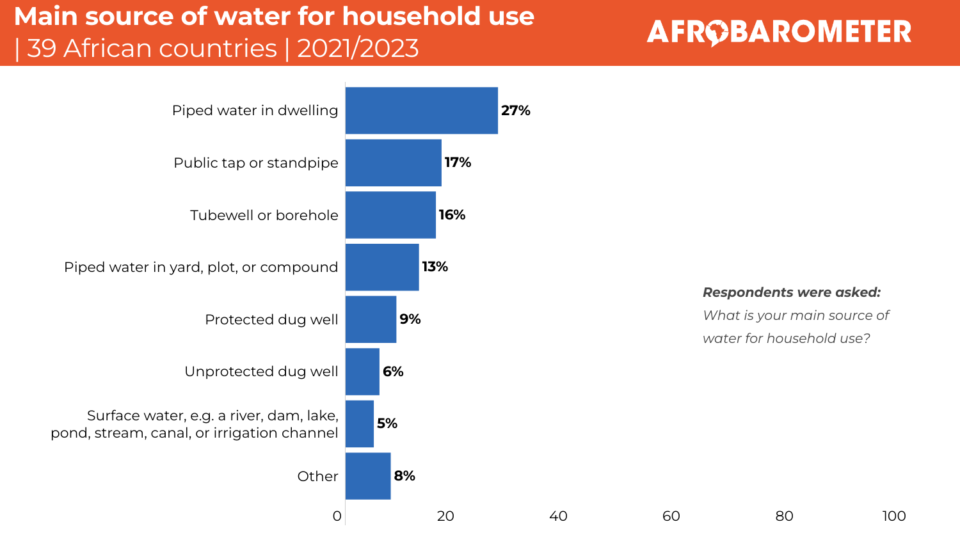A majority of Africans say their government is doing a poor job of providing water and sanitation services, the latest Afrobarometer Pan-Africa Profile shows.
The findings, based on 53,444 face-to-face interviews in 39 African countries, show that water supply and sanitation remain major challenges in most African countries, especially for rural populations and poor households.
Water supply ranks fourth among the most important problems that Africans want their government to address. More than half of citizens report that their household went without enough clean water for home use at least once during the year preceding the survey, including about a quarter who say this happened “many times” or “always.”
Key findings
- On average across 39 countries, a majority of citizens (61%) say their government is doing “fairly badly” or “very badly” on providing water and sanitation services, while only 38% offer positive assessments (Figure 1).
- Nearly six in 10 Africans (56%) say their household experienced a shortage of clean water during the previous year, including 24% who say this happened “many times” or “always” (Figure 2).
- Frequent water shortages were more common in rural areas (29%) than in cities (20%).
- Water supply ranks fourth among the most important problems that Africans want their government to address, trailing unemployment, management of the economy, and health (Figure 3).
- Water outranks all other problems in Benin and Mozambique, and ranks second in Guinea, Niger, Congo-Brazzaville, Tanzania, Togo, Ethiopia, and Namibia.
- Water supply is of particular concern among rural residents and the poor, who suffer major disadvantages on all indicators of access to clean water and sanitation.
- Fewer than one-third (31%) of surveyed enumeration areas (EAs) have sewage systems (Figure 4).
- Sanitation infrastructure varies dramatically by country, ranging from fewer than one in 10 EAs in Malawi (5%), Niger (9%), and Mozambique (9%) to more than two-thirds in South Africa (69%), Morocco (72%), and Tunisia (79%).
- One-third (34%) of respondents have a toilet in the home, while another 39% have facilities outside their dwelling but within their compound. One in five (19%) rely on toilets outside their compound, and 8% say they have no access to toilets or latrines (Figure 5).
Afrobarometer surveys
Afrobarometer is a pan-African, non-partisan survey research network that provides reliable data on African experiences and evaluations of democracy, governance, and quality of life. Nine survey rounds in up to 42 countries have been completed since 1999. Round 9 surveys (2021/2023) cover 39 countries.
Afrobarometer’s national partners conduct face-to-face interviews in the language of the respondent’s choice with samples of 1,200-2,400 adults that yield country-level results with margins of error of +/-3 to +/-2 percentage points at a 95% confidence level.

